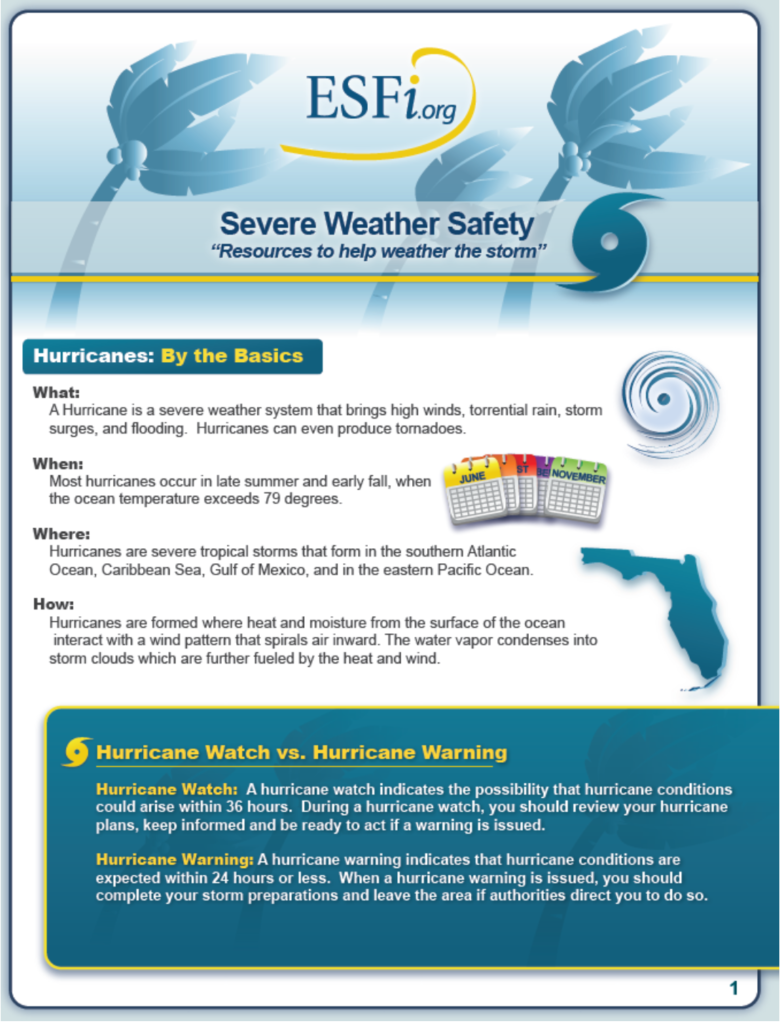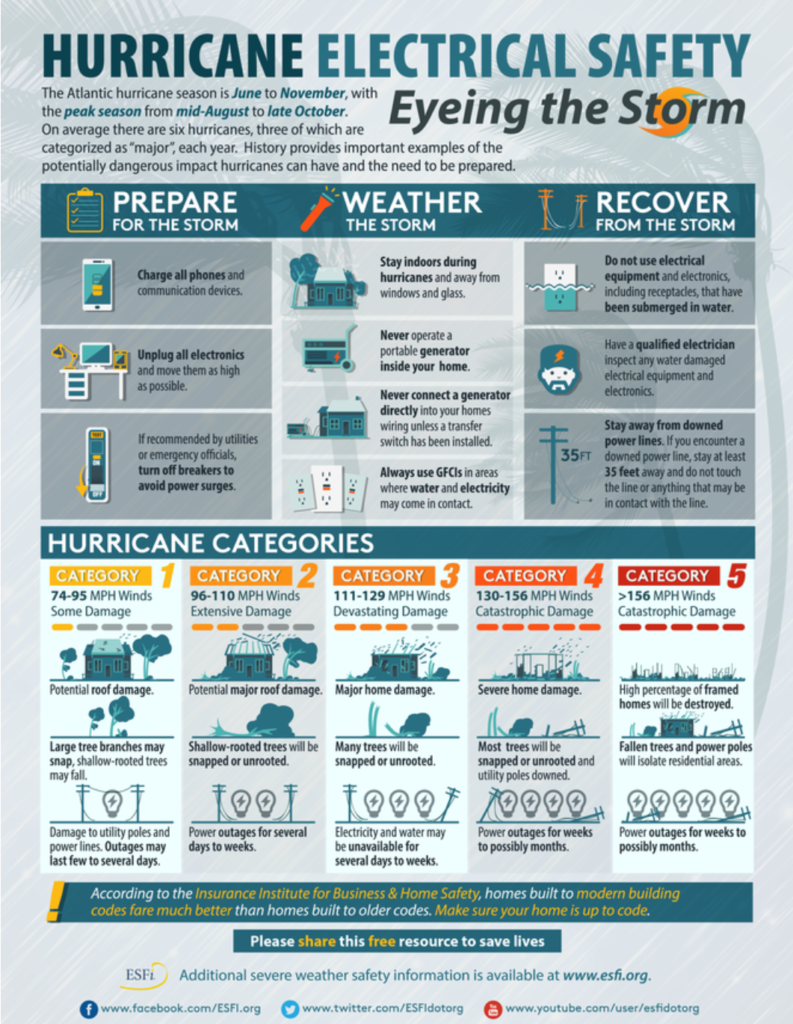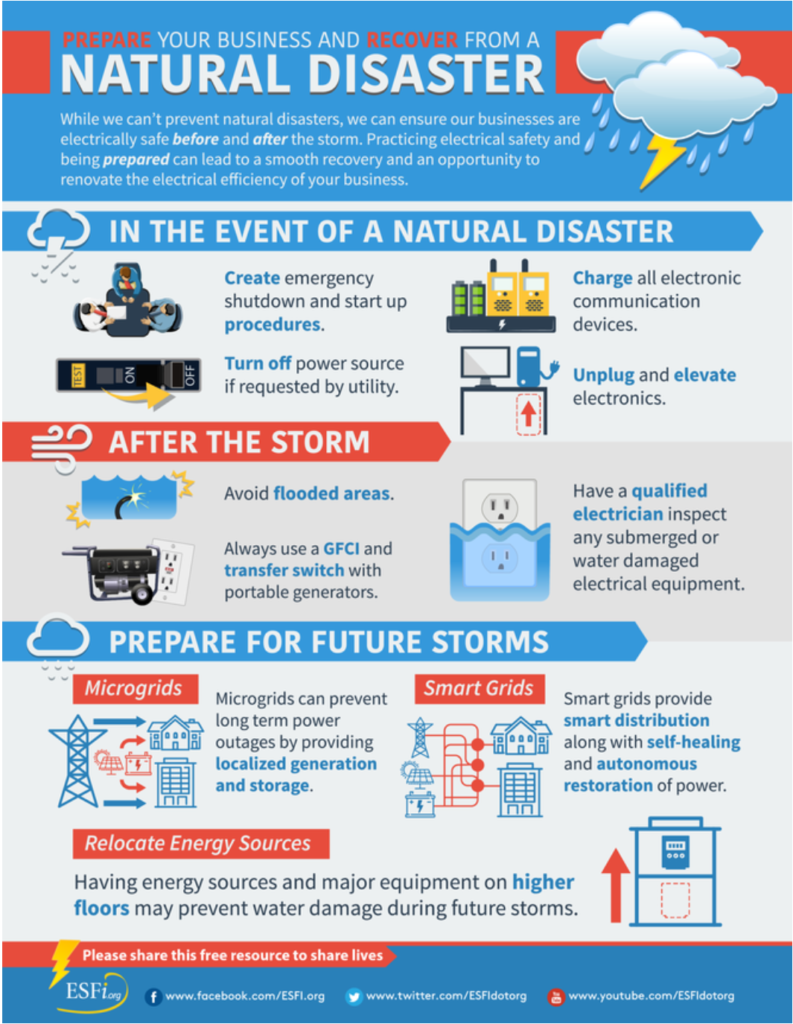Hurricane Center
WSTE Hurricane Updates
2023 Hurricane Season
Researchers at Colorado State University have been publishing season forecasts since the 1990′s. It’s a process that has been refined over decades. The team accurately predicted the nightmarish 2020 season, which delivered 31 tropical depressions, tying the record with 1995, as well as a record-breaking 30 tropical storms, 13 hurricanes, and 6 major hurricanes. While…
It's Never too Early to Prepare
The Atlantic hurricane season runs from June to November, with the peak season happening between mid-August to late October. On average there are six hurricanes, three which are categorized as “major,” each year. History provides important examples of the potentially dangerous impact hurricanes can have and the need to be prepared. Unfortunately, many of us don't begin preparing for a storm until AFTER we know that it is coming our way, but NOW is the time to prepare yourself, your family, and your community. To take action, ask youself the following questions:
- Do you have a plan to survive a disaster?
- Do you have an emergency supplies kit for your home and your car?
- Are your homeowners' and flood insurance policies in order?
- Have you planned your evacuation?
Do you have a plan for turning off your utilities? - Do you have a plan to secure the house/outdoor items/boat?
- Do you have copies of your insurance policies, important documents, and other valuables in a safe place?
- Do you have an inventory and a detailed description of your property?
- Has your roof been inspected in the last nine months?
- Have you had routine maintenance on your trees and shrubs around the house?
- Have you had routine maintenance done on your car and are the tires, including the spare, in good condition?
- Is your emergency phone list up to date?
- Have you made arrangements for your out-of-state communication contact?
- Do you have plans to address the "special needs" of family members?
- Have you decided what you will do with your animals?
- Do you have a recovery plan?
- Are you involved with community preparedness planning and education?
- Have you budgeted for the additional expenses to prepare your home, buy supplies and evacuate?
If you need any additional information or help in preparing for a hurricane, contact your local electric utility, the LSU Cooperative Extension Service or an Office of Emergency Preparedness.
Hurricane Categories
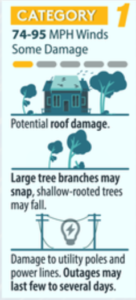
74 – 95 MPH Winds
Minimum surface pressure: higher than 980 mbar
Storm surge: 3-5 ft, 1.0-1.7 m
Some Damage
- Potential roof damage
- Large tree branches may snap, shallow-rooted trees may fall
- Damage to utility poles and power lines. Outages may last few to several days
Damage primarily to shrubbery, trees, foliage, and unanchored homes. No real damage to other structures. Some damage to poorly constructed signs. Low-lying coastal roads inundated, minor pier damage, some small craft in exposed anchorage torn from moorings. Example: Hurricane Jerry (1989).
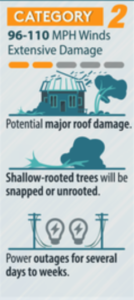
96 - 110 MPH Winds
Minimum surface pressure: 979-965 mbar
Storm surge: 6-8 ft, 1.8-2.6 m
Extensive Damage
- Potential major roof damage
- Shallow-rooted trees will be snapped or unrooted
- Power outages for several days to weeks
Considerable damage to shrubbery and tree foliage; some trees blown down. Major damage to exposed mobile homes. Extensive damage to poorly constructed signs. Some damage to roofing materials of buildings; some window and door damage. No major damage to buildings. Coast roads and low-lying escape routes inland cut by rising water 2 to 4 hours before arrival of hurricane center. Considerable damage to piers. Marinas flooded. Small craft in unprotected anchorages torn from moorings. Evacutation of some shoreline residences and low-lying areas required. Example: Hurricane Bob (1991).
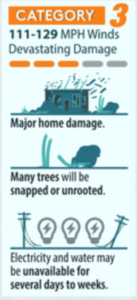
111 - 129 MPH Winds
Minimum surface pressure: 964-945 mbar
Storm surge: 9-12 ft, 2.7-3.8 m
Devastating Damage
- Major home damage
- Many trees will be snapped or unrooted
- Electricity and water may be unavailable for several days to weeks
Foliage torn from trees; large trees blown down. Practically all poorly constructed signs blown down. Some damage to roofing materials of buildings; some wind and door damage. Some structural damage to small buildings. Mobile homes destroyed. Serious flooding at coast and many smaller structures near coast destroyed; larger structures near coast damaged by battering waves and floating debris. Low-lying escape routes inland cut by rising water 3 to 5 hours before hurricane center arrives. Flat terrain 5 feet or less above sea level flooded inland 8 miles or more. Evacuation of lowlying residences within several blocks of shoreline possibly required. Example: Hurricane Gloria (1985).
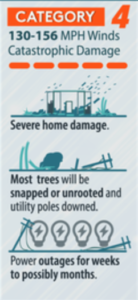
130 - 156 MPH Winds
Winds: 131-155 mph, 114-135 kts, 210-249 km/h
Minimum surface pressure: 944-920 mbar
Storm surge: 13-18 ft, 3.9-5.6 m
Catastrophic Damage
- Severe home damage
- Most trees will be snapped or uprooted and utility poles downed
- Power outages for weeks to possibly months
Shrubs and trees blown down; all signs down. Extensive damage to roofing materials, windows, and doors. Complete failure of roofs on many small residences. Complete destruction of mobile homes. Flat terrain 10 feet or less above sea level flooded inland as far as 6 miles. Major damage to lower floors of structures near shore due to flooding and battering by waves and floating debris. Low-lying escape roues inland cut by rising water 3 to 5 hours before hurricane center arrives. Major erosion of beaches. Massive evacuation of all residences within 500 yards of shore possibly required, and of single story residences within 2 miles of shore. Example: Hurricane Charley (2004).
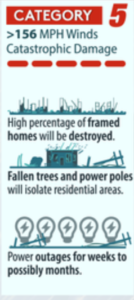
>156 MPH Winds
Minimum surface pressure: lower than 920 mbar
Storm surge: higher than 18 ft, 5.6m
Catastrophic Damage
- A high percentage of framed homes will be destroyed
- Fallen trees and power poles will isolate residential areas
- Power outages for weeks to possibly months
Shrubs and trees blown down; considerable damage to roofs of buildings; all signs down. Very severe and extensive damage to windows and doors. Complete failure of roofs on many reisdences and industrial buildings. Extensive shattering of glass in windows and doors. Some complete building failures. Small buildings overturned or blown away. Complete destruction of all structures less than 15 feet above sea level within 500 yards of shore. Low-lying escape routes inland cut by rising water 3 to 5 hours before hurricane center arrives. Massive evacuation of residential areas on low ground within 5 to 10 miles of shore possibly required. Example: Hurricane Camille (1969).
Hurricane Safety Resources
Provided by the Electrical Safety Foundation International (ESFI).
Hurricane Maps
Public Information Map
This map is intended to provide general awareness of current and recent tropical weather around the world. It is not intended to replace authoritative government websites but rather to provide situational awareness.
Hurricane Aware Map
Use this map to find information about the potential impacts of tropical storms and hurricanes in the US using Living Atlas data.




